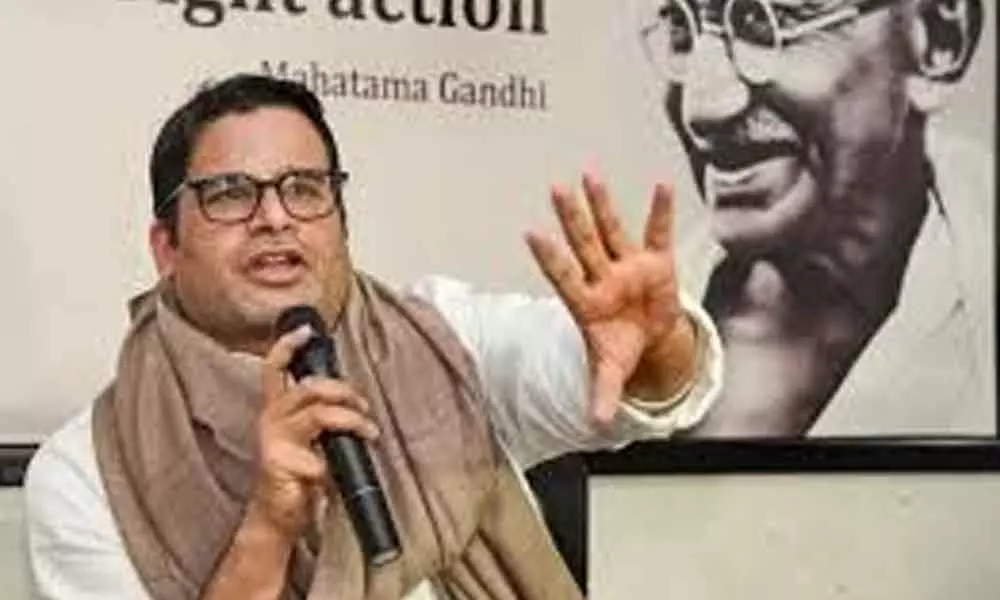Live
- Chanchalguda Jail Officials Say They Haven't Received Bail Papers Yet, Allu Arjun May Stay in Jail Tonight
- BJP leaders present evidence of illegal voters in Delhi, urge EC for swift action
- Exams will not be cancelled: BPSC chairman
- Nagesh Trophy: Karnataka, T.N win in Group A; Bihar, Rajasthan triumph in Group B
- YS Jagan condemns the arrest of Allu Arjun
- Economic and digital corridors to maritime connectivity, India and Italy building vision for future, says Italian Ambassador
- SMAT 2024: Patidar's heroics guide Madhya Pradesh to final after 13 years
- CCPA issues notices to 17 entities for violating direct selling rules
- Mamata expresses satisfaction over speedy conviction in minor girl rape-murder case
- Transparent Survey Process for Indiramma Housing Scheme Directed by District Collector
Just In
Corona crisis has increased anger against system: Prashant Kishor


New Delhi: In the first analysis by the man widely considered Indias foremost electoral strategist, Prashant Kishor has said the crisis has increased...
New Delhi: In the first analysis by the man widely considered Indias foremost electoral strategist, Prashant Kishor has said the crisis has increased the already existing levels of frustration and anger felt by Indias vulnerable and poor people for the system.
Kishor defined the system as not just the government, but the ruling establishment. Up until now the crisis has not affected the Prime Minister's standing and many who have suffered will have appreciated his apology. Also, as in a situation of war, in a crisis like this there is an initial tendency to rally around the flag and government. Modi will benefit from that.
However, things could change if the suffering increases both in terms of its economic cost and human cost. In an interview with Karan Thapar, Prashant Kishor, who is widely acknowledged as the electoral genius behind Modi's 2014 campaign, which first made him the Prime Minister, said that if the economic damage, particularly loss of jobs and hunger, and deaths increase sharply it will definitely damage the BJP and the Prime Minister's standing. In the end, the buck will stop with Modi. Just as he will take the credit if all goes well, similarly the blame will be pinned on him if the outcome is the opposite.
Prashant Kishor said the same could be said of the state governments. If the suffering increased, they too will be blamed. It is not just the Central government that will face the anger of the people.
He said the Central government was slow to react to the coronavirus crisis and was "still behind the curve". He said the people at the very top, who he did not identify by name, did not seriously respond till March 20.
Kishor said it was hard to tell what tens or hundreds of millions of daily wage workers, landless agricultural labour and unemployed unorganised sector workers felt about the BJP government and Modi. He was more certain that they will be angry with the system. Anger against the Prime Minister and BJP could depend on how severe the suffering becomes. However, he made a point of saying that if the lockdown had been announced for seven days at a time, rather than 21 at one go, the poor and vulnerable would have been more confident of being able to withstand it and would not have begun walking back to their villages hundreds or thousands of miles away. If he had been asked this is the advice he would have given regarding the lockdown.
He also criticised the government's communication. He said press conferences were held by bureaucrats. If they were held by top ministers who were transparent and open it would give the country a higher level of confidence in the government's handling of the crisis.
Speaking about the opposition parties, Prashant Kishor had three points of advice to give. They must not oppose and criticise for the sake of criticising. Second, on what he called "the right points" they should support the government. Third and most importantly, they must go out to the grass roots and comfort and support people. He categorically said there was no evidence he could find that this third element of his advice was being followed. Leaders were tweeting from the comforts of Delhi and Mumbai or state capitals but not going to the people to be with them.
Kishor said that whether the damage the BJP and Modi could suffer would affect their election chances was very difficult to say because elections are four years away and this will also turn on the opposition's ability to unite and find a face to take on the PM. But anything can happen, he added. Who knew in 1986 Rajiv Gandhi would lose three years later? Who could say in 1973 or 1975 Indira Gandhi would lose in 1977?
Prashant Kishor said his organisation IPAC had studied elections in over 5,100 constituencies since Modi's 2014 victory and BJP had only won around 1,500 whilst Congress had won approximately 1,040. The rest had been won by other parties or individuals. Therefore, whilst the BJP was the dominant party you cannot write off the others. This was his answer to a question when asked if he accepted India had entered a period, similar to 1947-77, when we had once again became a one party democracy with the BJP as that party. The clear inference was that with proper planning the apparent dominance of the BJP -- which at one point he called hegemony -- can be overturned.

© 2024 Hyderabad Media House Limited/The Hans India. All rights reserved. Powered by hocalwire.com






